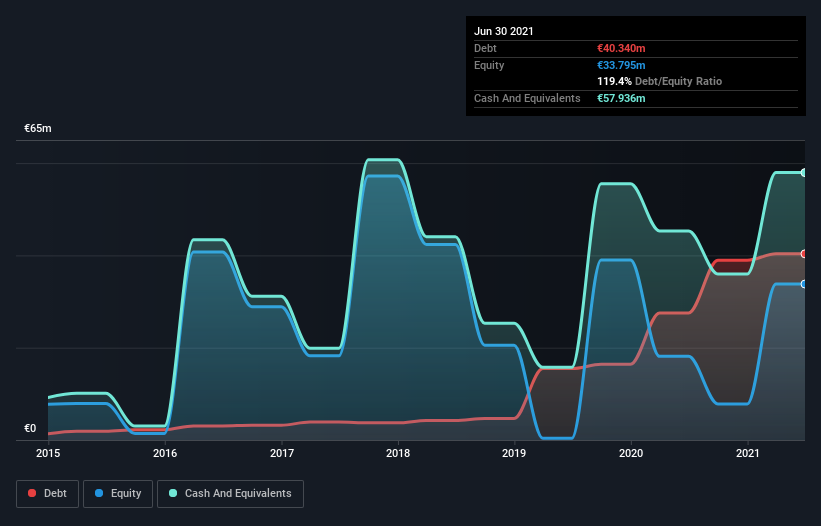
The external fund manager backed by Berkshire Hathaway's Charlie Munger, Li Lu, makes no bones about it when he says 'The biggest investment risk is not the volatility of prices, but whether you will suffer a permanent loss of capital.' So it seems the smart money knows that debt - which is usually involved in bankruptcies - is a very important factor, when you assess how risky a company is. Importantly, Carmat SA (EPA:ALCAR) does carry debt. But should shareholders be worried about its use of debt?
Why Does Debt Bring Risk?
Debt is a tool to help businesses grow, but if a business is incapable of paying off its lenders, then it exists at their mercy. Part and parcel of capitalism is the process of 'creative destruction' where failed businesses are mercilessly liquidated by their bankers. While that is not too common, we often do see indebted companies permanently diluting shareholders because lenders force them to raise capital at a distressed price. Of course, plenty of companies use debt to fund growth, without any negative consequences. When we think about a company's use of debt, we first look at cash and debt together.
See our latest analysis for Carmat
What Is Carmat's Net Debt?
As you can see below, at the end of June 2021, Carmat had €40.3m of debt, up from €27.5m a year ago. Click the image for more detail. However, it does have €57.9m in cash offsetting this, leading to net cash of €17.6m.

A Look At Carmat's Liabilities
Zooming in on the latest balance sheet data, we can see that Carmat had liabilities of €12.4m due within 12 months and liabilities of €40.9m due beyond that. Offsetting this, it had €57.9m in cash and €4.00m in receivables that were due within 12 months. So it actually has €8.66m more liquid assets than total liabilities.
This short term liquidity is a sign that Carmat could probably pay off its debt with ease, as its balance sheet is far from stretched. Succinctly put, Carmat boasts net cash, so it's fair to say it does not have a heavy debt load! The balance sheet is clearly the area to focus on when you are analysing debt. But it is future earnings, more than anything, that will determine Carmat's ability to maintain a healthy balance sheet going forward. So if you're focused on the future you can check out this free report showing analyst profit forecasts.
Given its lack of meaningful operating revenue, Carmat shareholders no doubt hope it can fund itself until it can sell some of its new medical technology.
So How Risky Is Carmat?
We have no doubt that loss making companies are, in general, riskier than profitable ones. And the fact is that over the last twelve months Carmat lost money at the earnings before interest and tax (EBIT) line. Indeed, in that time it burnt through €55m of cash and made a loss of €42m. However, it has net cash of €17.6m, so it has a bit of time before it will need more capital. Overall, its balance sheet doesn't seem overly risky, at the moment, but we're always cautious until we see the positive free cash flow. When analysing debt levels, the balance sheet is the obvious place to start. However, not all investment risk resides within the balance sheet - far from it. For instance, we've identified 4 warning signs for Carmat (1 is a bit concerning) you should be aware of.
At the end of the day, it's often better to focus on companies that are free from net debt. You can access our special list of such companies (all with a track record of profit growth). It's free.
If you're looking to trade Carmat, open an account with the lowest-cost platform trusted by professionals, Interactive Brokers.
With clients in over 200 countries and territories, and access to 160 markets, IBKR lets you trade stocks, options, futures, forex, bonds and funds from a single integrated account.
Enjoy no hidden fees, no account minimums, and FX conversion rates as low as 0.03%, far better than what most brokers offer.
Sponsored ContentNew: AI Stock Screener & Alerts
Our new AI Stock Screener scans the market every day to uncover opportunities.
• Dividend Powerhouses (3%+ Yield)
• Undervalued Small Caps with Insider Buying
• High growth Tech and AI Companies
Or build your own from over 50 metrics.
Have feedback on this article? Concerned about the content? Get in touch with us directly. Alternatively, email editorial-team (at) simplywallst.com.
This article by Simply Wall St is general in nature. We provide commentary based on historical data and analyst forecasts only using an unbiased methodology and our articles are not intended to be financial advice. It does not constitute a recommendation to buy or sell any stock, and does not take account of your objectives, or your financial situation. We aim to bring you long-term focused analysis driven by fundamental data. Note that our analysis may not factor in the latest price-sensitive company announcements or qualitative material. Simply Wall St has no position in any stocks mentioned.
About ENXTPA:ALCAR
Carmat
Designs and develops total artificial heart for people suffering from end-stage biventricular heart failure in France and internationally.
High growth potential low.
Market Insights
Community Narratives



